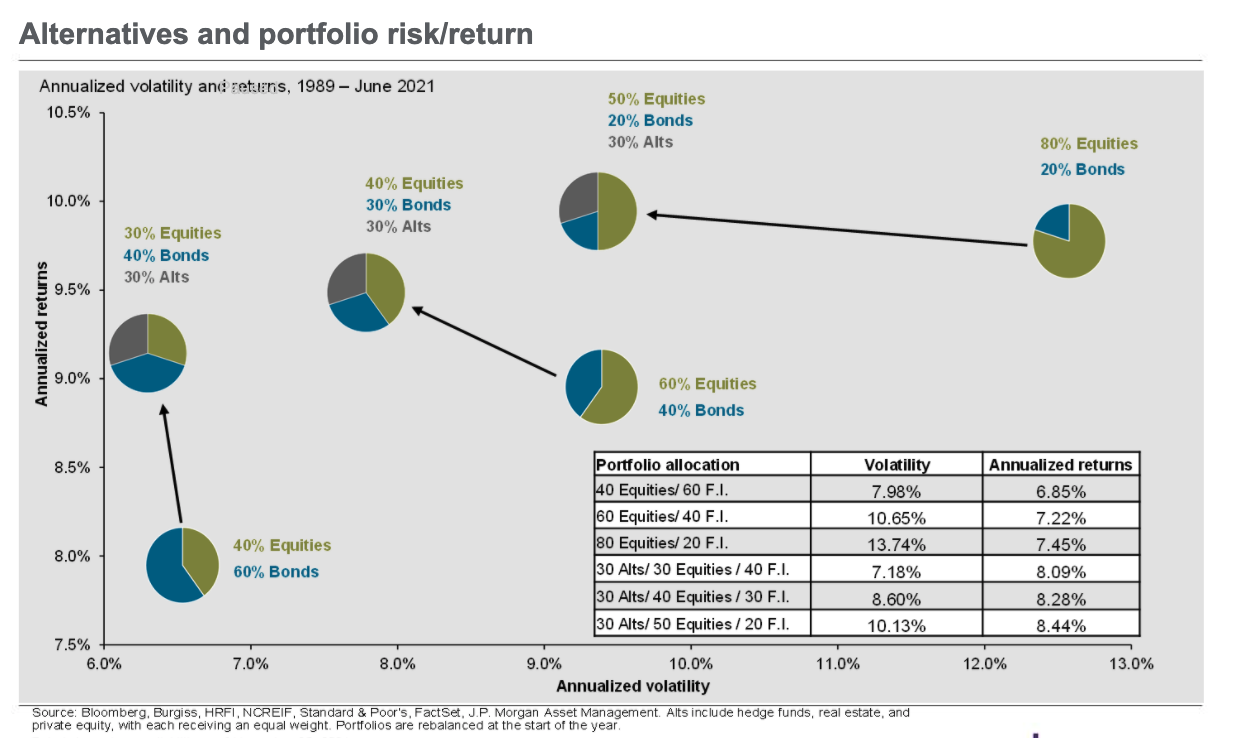Why credit markets won’t deliver but Alternatives might
If income is your primary investment goal, a broad fixed income exposure is only going to get you halfway there, at best, based on recent returns. So said JP Morgan Asset Management’s global head of alternatives, Anton Pil, during a recent webinar.
Alongside Zenith Investment Partners CEO and co-founder David Wright, he outlined his view of the Alternatives sector across three broad categories:
- Alpha
- Income
- Diversification.
“My rule of thumb for each of those subgroups is, if you’re going for return, you’d better be targeting equities plus 2% or 3% because otherwise you’re just not getting there,” Pil said.
But it’s income, sources of which have become increasingly difficult to find as bond yields have fallen over the last couple of years, that has been the most popular category.
“On the income side, I’d argue you probably need twice what you’d get in traditional fixed income – not necessarily when you’re talking about high yield assets but from the broader pool of fixed income,” Pil said.
Three types of Alternatives
Breaking down the above three categories further, he classifies Alternatives as:
- Assets that will go into your fixed-income-like allocation
- Hybrids, which generate some of the above type of returns “but have too much equity beta”
- Equity-like assets.
“Just like in a traditional asset allocation, some of those you need to own all the time, or at least remain part of a core foundation of your portfolio," Pil said.
Characterised by their lower-risk and lower volatility, examples include real assets and private debt. But he emphasises this will sometimes vary depending on the market environment at any given time.
He also suggests that adding one-third hedge funds, one-third real assets and one-third private equity to a more traditional 60/40 portfolio (equity/bonds) may provide a noticeable efficiency boost.

“My fixed income colleagues tell me this is cheating and that the volatility numbers look lower than they really are because you only mark the portfolio about once a month or once a quarter; these assets aren’t liquid,” Pil said.
“That’s true, but if you own an asset that’s less liquid and it keeps your clients invested longer and keeps them riding through volatile markets, that’s a good outcome.”
“Inflation is here — you’ve got to live with it”
Having grown up in Brazil – an economy whose hyperinflation is the stuff of legend, having averaged more than 320% between 1980 and the present day – Pil also weighed into the topic of inflation.
He disparaged the “inflation is transitory” argument, arguing it is “here in full force.”
“Everyone keeps blaming the (supply chain) bottlenecks with the expectation that when they’re finished, everything will be great. But the bottleneck is there because trade and consumption have risen dramatically,” Pil said.
He referred to the example of container companies, where shipping prices are 10% higher because loads now are far bigger than they were two or three years ago.
“I think inflation is here to stay and you’ve got to live with it,” Pil said.
Commodities are "dead"
This is largely why he believes real assets such as listed and unlisted property and infrastructure will be increasingly important in providing investors with more “portfolio stability” in the years ahead.
He noted that commodities are also often included in the real assets grouping, but described them as “almost dead.”
“If I put them in a room and I come back a year later, they’re still there – they weren’t productive to society. So I find that owning something that has an income attached to it is particularly powerful,” Pil said.
Why assets aren't "airbags"
Responding to an audience question about macroeconomic-focused fund performance in periods of lower volatility, he emphasises they should deliver decent returns through the cycle.
“I’m not a huge believer that you should own an asset that’s an airbag. At that point you might as well just hold cash,” Pil said.
“Macro managers should always be able to add value, I think of it as cash plus 5%. Some years it’ll be up 15% and some it will be down 7%, but I hope it will be the former in an environment where there’s not much going on in equity and down seven when equities are up between 10% and 15%.”
Zenith’s Wright agreed with this view while conceding there is some evidence to support a view that some Alternative funds have only performed in periods of market drawdown.
“But I think a lot of people have failed to notice the sneaky returns that strategies like global macro and managed futures have generated,” he said.
“The more neutral hedge funds have been creeping up in performance.”
Asked which parts of the broad real assets sector they regard as most appealing from here, both Wright and Pil point to industrial property as a clear leader. This is driven largely by sustainable demand for online shopping logistics.
“That’s certainly something we’re seeing playing out here in Australia, as retailers follow the Amazon model of the US, where logistics centres are being brought closer to the customers,” Wright said.
Pil also calls out retail property as a potential “sleeper surprise”, given the strong uptick in physical store visits by shoppers in the US. “But definitely, industrial is the much safer pick,” he said.
Consider the Alternatives beyond traditional assets
To watch a replay of this webinar, click here. For further information on alternative assets and how to incorporate them into portfolio construction click here.
1 topic

